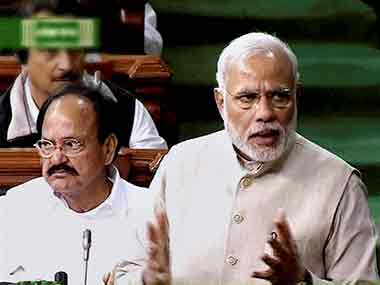Starting with paying rich tribute to Dalit leader and chairman of the Constituent Assembly Dr Babasaheb Ambedkar to speaking on religion and role of the state, Prime Minister Narendra Modi on Friday in his address to the Lok Sabha said India first was the only religion and Constitution was the only book. Modi’s speech brought a close to a two-day session of Parliament on the role of Ambedkar in creating the Constitution. In his address, which lasted more than an hour, the prime minister largely steered clear of controversial statements or any political jibes. This was after members of Parliament from the government and the Opposition hit out at each other while discussing Constitutional provisions. He ruled out any review of the Constitution and reached out to the Opposition by saying, that the ruling side does not believe in forcing decisions using its majority but believes in working through consensus. Modi had words of praise for the country’s first Prime Minister Jawaharlal Nehru, recalling that when Lohia told him that his policies were not working, Nehru said, “I cannot deny those facts,” saying that it reflected his maturity. [caption id=“attachment_2524296” align=“alignleft” width=“380”]  PM Narendra Modi speaking in Lok Sabha on Friday.[/caption] Referring to discrimination and oppression faced by Ambedkar during his own life, Modi said, “It was Ambedkar’s greatness that he faced oppression, but did not seek to be vindictive when he drafted the Constitution.” Pointing out that the Constitution gave an equal status to marginalised and backward sections of society, Modi remarked, “What would have happened to the oppressed classes if Modi had not been at the help of the Constituent Assembly?” Recalling the heated debates over Ambedkar’s legacy over the past two days, Modi noted that those criticising the government and those opposing, it had quoted him. Earlier on Friday, Finance Minister Arun Jaitley had asked what the Parliament’s reaction would have been if Ambedkar had proposed Article 44 (uniform civil code) and Article 48 (which deals with prohibition of cow slaughter) in the present day. Congress president Sonia Gandhi, on her part, had said that the ideals of the Constitution are under threat and said that it was the Congress which brought Ambedkar into the Constituent Assembly. Stressing that the Constitution should not remain limited to legislative houses, Modi said, “The need of the hour is to make people aware of the strength of the Constitution.” Modi suggested a greater emphasis on teaching aspects of constitutional provisions and the process of framing the Constitution in the school syllabus. The prime minister noted that while the emphasis has mostly been on rights, there is a need to remember duties laid down in the Constitution as well. Modi also emphasised the religious and culural diversity in India in India saying that all religions of the world are followed in India and that a large number of languages and dialects are spoken. While staying away from the mention of ‘secularism’, Modi reiterated his statement made on several occasions earlier saying, “For the government, the only ‘dharma’ is ‘India first, the only ‘dharma granth’ (holy book) is the Constitution,” the Prime Minister asserted in his about 70-minute reply to the debate during which Opposition members raked up the issue of ‘intolerance’ and questioned his silence over the issue. “The country will run by the Constitution and it should be run by the Constitution. India has fundamentally grown on this ideology. The country has the internal energy amassed over thousands of years which gives it the stimulus and capacity to deal with crises,” Modi said. Invoking Mahatma Gandhi, B R Ambedkar and Nehru repeatedly, he underlined that the ‘Idea of India’ is reflected by the aspects like ‘Ahimsa Parmo Dharma (non-violence is supreme duty), ‘Sarv Dharma Sambhav’ (equal respect to all religions) and ‘Vasudev Kutumbakam’ (entire world is a family). “Our country has been there for thousands of years. Shortcomings do come. Even vices do crop up. But there is something that keeps us going. Even when vices come up, solutions also emerge from within the society….It is like ‘auto pilot corrective arrangement and this is our strength,” the Prime Minister. Asserting that the thrust of his government is on ‘sabka sath’ (cooperation from all), he said, “no section of the society should lag behind. If any part of the body is paralysed, the body cannot be called healthy. We have to empower people from all sections, be it any community, region or language.” Noting that India has 12 religions, 122 languages and 1600 dialects and comprises people who are believers in God as well as athiest, he said, “all should get justice. There should be harmony.” With inputs from PTI
Prime Minister Narendra Modi paid rich tributes to Dalit leader and the head of the Constituent Assembly Dr Babasaheb Ambedkar in his address to the Lok Sabha on Friday
Advertisement
End of Article


)
)
)
)
)
)
)
)
)



